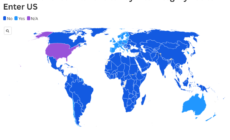-
Ex-MLB pitcher sleeping with family nanny guns down in-laws amid financial struggles - 13 mins ago
-
Alabama, Kalen DeBoer Land Huge News Regarding Elite 2026 QB - 19 mins ago
-
Fox News Entertainment Newsletter: ‘The Cosby Show’ star dead at 54, Christie Brinkley’s devastating moment - 22 mins ago
-
College Football Stock Watch: Teams Joel Klatt Is Buying, Selling Stock in for 2025 - 28 mins ago
-
L.A. Unified test scores rise above pre-pandemic levels. - 34 mins ago
-
Growing share of retirees lean heavily on Social Security, AARP says - 38 mins ago
-
Texas couple finds royal tomb, plus best gas stations for food - 51 mins ago
-
Phillies Called ‘Best Fit’ In Blockbuster Trade For Red Sox All-Star Jarren Duran - 58 mins ago
-
Bill Cosby mourns Malcolm-Jamal Warner, his on-screen son - about 1 hour ago
-
Trey Hendrickson Posts Florida Highway Photo Amid Bengals Contract Holdout - about 1 hour ago
China-Linked Scam Centers Targeting More US Victims: Report
Asian scam centers are cheating Americans out of billions of dollars a year while enjoying at least the implicit backing of elements in the Chinese government and the threat posed by the “pig-butchering” fraud gangs is growing, a U.S. congressional commission said.
The U.S-China Economic and Security Review Commission said efforts to tackle the problem are fragmented and under-resourced and without a coordinated push to raise public awareness, equip law enforcement, and take aggressive action to expose and deter the scams, American losses would almost certainly escalate.
Newsweek reached out to China’s foreign ministry for comment.
Photo by LILLIAN SUWANRUMPHA/AFP via Getty Images/Getty Images
Why It Matters
The announcement points to another source of friction between the United States and China, its main strategic rival
Americans lost at least $5 billion to online scams in 2024, according to very conservative estimates, an increase of 42 percent over the previous year, the commission said in a report. It cited the case of an elderly Virginia man who committed suicide after being cheated out of his life savings.
The proliferation of scam centers run by ethnic Chinese criminal gangs in some of the more lawless corners of Southeast Asia has also enabled China to expand its influence in the region, fueled corruption, violence and human trafficking while undermining the ability of governments to control what happens in their territory.
What to Know
The scamming is known as “pig butchering” and involves fraudsters making contact with unsuspecting people online, building a relationship with them and then defrauding them. This type of fraud can also be known as a “romance scam.”
An expert working group convened by the United States Institute of Peace estimated that the scams generated $63.9 billion in global revenue in 2023, with Myanmar, Cambodia, and Laos at the epicenter of the operations.
The scam centers, where thousands of victims of human trafficking are forced to work, proliferated during the COVID-19 pandemic when in the absence of visiting gamblers gangs re-purposed empty casinos to focus on fraud.
Ethnic Chinese gangsters initially hunted for victims in China but that triggered action by Chinese authorities, the U.S. commission said.
“Bejing has selectively cracked down on scam centers that target Chinese victims, leading Chinese criminal organizations to conclude that they can make greater profits with lower risk by targeting citizens of wealthy countries such as the United States,” it said.
As the Chinese criminal networks expanded, they developed a mutually beneficial relationship with Chinese officials eager to promote their Belt and Road Initiative, or BRI, a network of transport and energy infrastructure aimed at linking China to markets in Europe, the Middle East and Africa.
“Known syndicates invested large sums in infrastructure projects branded under the BRI, helping build the physical and digital backbone of their scamming operations in places like Cambodia and the Thai-Burmese border. In turn, Chinese officials and state-owned enterprises backed these projects to demonstrate progress advancing the BRI – despite their ties to transnational crime,” it said.
“While Beijing has taken action against criminal groups that defy its control, it has often turned a blind eye when syndicates align with the CCP’s broader agenda,” the commission said, referring to the Chinese Communist Party.
China has also exploited the problem of scam centers to expand its influence throughout Southeast Asia, the commission said. It cited reports indicating that scam centers in the Philippines were likely linked to Chinese espionage efforts.
Beijing has also used the issue of the Chinese transnational criminal gangs as an excuse to pressure Southeast Asian countries to agree to a greater role for Chinese security forces in the region, it said.
The International police organization Interpol said last month “human trafficking-fueled scam centres have expanded their global footprint” beyond Southeast Asia.
What People Are Saying
The U.S-China Economic and Security Review Commission said: “Beijing has placed intense pressure on governments in Southeast Asia to crack down on scam centers that target Chinese victims. Yet these selective crackdowns have done little to disrupt the increasing scale and scope of scam centers in the region. Instead, China’s focus on protecting Chinese victims has accelerated the shift toward targeting Americans.”
Interpol said in a June 30 statement: “Online scam centres have increasingly been observed in other regions, including the Middle East, West Africa – which could be developing into a new regional hub – and Central America.”
What Happens Next
There seems to be no sign that levels of online fraud can be cut in the absence of concerted action by governments around the world.
Source link






























